イベント&アクティビティ
DIJ online talk on Minakata Kumagusu, Queer Nature, and the Microbial Paradigm
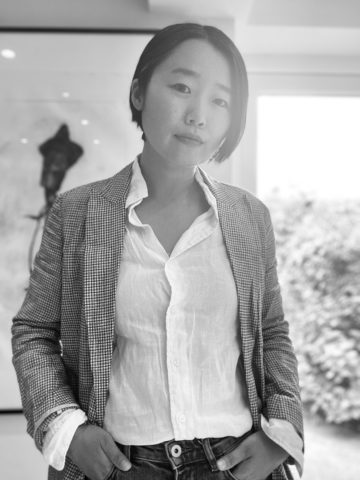
This talk in the DIJ Environmental Humanities in East Asia lecture series considers the role of non-humans in the intellectual history of modern Japan through the case study of the Buddhist naturalist-polymath Minakata Kumagusu. Building on Kumagusu’s fascination over the microbe slime mold, Eiko Honda delineates the ways in which a parallel paradigm of interdisciplinary knowledge production emerges when the historian places microbes as the basis for the historical actor’s truths (‘queer nature’). The paper reveals a novel account of civilization theory and evolutionism that eventually formulated what she calls the ‘microbial paradigm’ that existed in history, but not in historiography. The talk reflects on what’s at stake when one does or does not decentre the focal point of knowledge production in history, and what kind of implications it may have on present-day research and teaching in area studies. Details and registration here
Eiko Honda, Aarhus University
DIJ Method Talk on Delphi Survey, Technology, and Unpaid Domestic Work

The future of work has emerged as a prominent topic for research and policy debate. In this session of the DIJ Method Talk series, Lulu Shi and Nobuko Nagase will discuss and present results from their Delphi survey to predict how technology may transform unpaid domestic work. On average, 65 AI experts from the UK and Japan predicted that 39 percent of the time spent on 17 housework and care work tasks will be automatable within ten years. The survey provides the first quantitative estimates concerning the future of unpaid work and demonstrates how such predictions are socially contingent, with implications to forecasting methodology. It also investigates how willingness to use smart technologies varies across gender, household income, time pressure, type of domestic work, and its price. Details and registration here
Lulu Shi, Oxford University and Nobuko Nagase, Ochanomizu University
Franz Waldenberger discusses Global Knowledge Infrastructures

The sheer volume of numbers, data, and facts is growing and the speed of generating scientific knowledge is ever accelerating. As access to knowledge is becoming more global and digital through open-source projects, its reliability, verifiability, and accessibility has been called into question. But establishing a sustainable knowledge infrastructure can also be a key to securing economic growth, welfare, and individual well-being. Together with Thomas Elm (Managing Director Europe, Goodpatch GmbH), DIJ director Franz Waldenberger will discuss how a stable knowledge infrastructure can be created and sufficiently maintained. What are the challenges to providing this infrastructure for and with an intercultural Japanese-German background? What is the potential of the digital transformation for growth and a reliable knowledge infrastructure? This on-site event takes place on September 13 at the Japanese-German Center Berlin as part of the ‘Hiru no kai’ discussion series, organised by the Japanese-German Business Association (DJW). Details and registration here
Job opening: Research Fellow in Asian Infrastructures at NUS
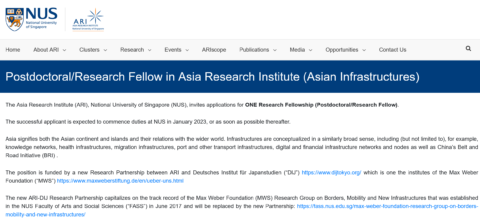
The Asia Research Institute (ARI) at the National University of Singapore (NUS) invites applications for one Research Fellowship (Postdoctoral/Research Fellow) in Asian Infrastructures. This position is funded by a new research partnership between the DIJ and ARI which was concluded in July 2022. The position is based at NUS and the successful applicant is expected to commence duties in January 2023, or as soon as possible thereafter. Applicants are expected to hold a PhD degree (or awaiting conferment) and have research interests in a relevant area of the social sciences and a record of publication (or potential to deliver) in high impact journals and/or reputable publishing houses. The initial appointment will be for a period of two years, with the possibility of renewal for two more years. Closing date for applications is 30 September 2022. For more details on this position and the application procedure see here
DIJ Study Group with Cornelia Storz compares flexible and rigid retrenchment strategies
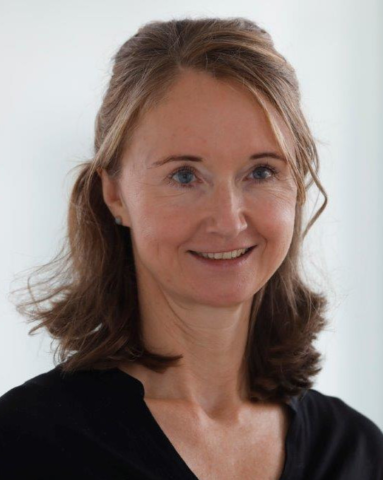
Firms in many advanced economies practice flexible retrenchment strategies to react to a crisis or to adjust to organisational decline in order to lower labour costs. Building on signalling theory and the neo-institutional and resource-based view, this presentation analyses two research questions: (1) What are the effects of “flexible retrenchment strategies” (such as wage-based and functional flexibility) on investor reactions as compared to “rigid strategies” (such as pure downsizing)? (2) How do a firm’s knowledge assets shape the relationship between investor reactions to flexible strategies as compared to rigid strategies? Using a novel data set of 242 retrenchment announcements by Japanese firms, the study finds that flexible strategies are significantly and positively associated with a higher likelihood that the firm value of retrenchers increases. This suggests that investors perceive flexible strategies as a capability signal, rewarding innovative firms depending heavily on the knowledge of their employees. Details and registration here
Cornelia Storz, Goethe University Frankfurt
DIJ researchers and alumni at 18th Japanologentag
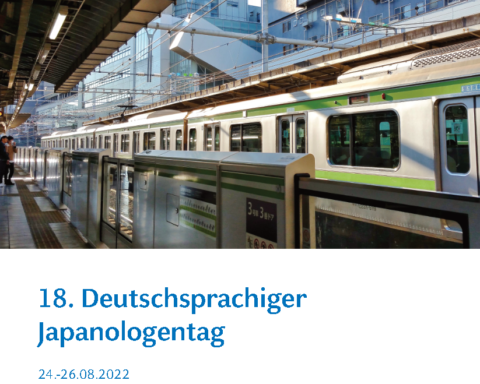
Six DIJ researchers and more than 30 DIJ alumni will be active at the 18th German-speaking Japanese Studies Conference (Deutschsprachiger Japanologentag) as panelists, chairs, and section organisers. Harald Kümmerle (“Die japanische Initiative ‘Data Free Flow With Trust’ aus infrastruktureller und begriffsgeschichtlicher Perspektive”), Markus Heckel (“Die unkonventionelle Geldpolitik der Bank von Japan”), and Celia Spoden (“Soziale Chancen und Risiken digitaler Technologien: Cybernetische Avatare und cyberphysische Räume als neue Möglichkeiten zur Partizipation an der Arbeitswelt”) will give presentations in the Economics section. Harald will also present a paper on “Big Data” (“Wissenschaftsgeschichtliche Verortung von ‘Big Data’ und Implikationen für die Verwendung digitaler Methoden in der Japanologie”) in the panel on Digital Methods. Together with co-editor and DIJ alumnus Hanno Jentzsch, Sonja Ganseforth will give a book talk on Rethinking Locality in Japan in the Ethnology section. Barbara Holthus and Nora Kottmann are convenors of the Sociology section. The conference takes place online from 24-26 August, 2022. Details and programme (in German) here
Online talk by Lisa Onaga on Silk-Making Knowledge in Amami Ōshima
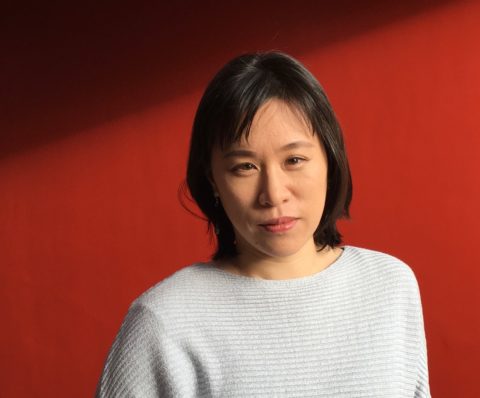
The signature designs featured on Amami Ōshima tsumugi textiles today are so intricate that they can resemble shimmering pixels on a computer screen. Even though designers have been confined to the geometry of squares, the patterns appearing on these textiles have changed remarkably over time. Why? This talk reflects upon recent fieldwork conducted in Amami Ōshima driven by this simple question. Study of the dynamic process of textile production illuminates the complicated archipelagic location between Kagoshima and Okinawa that has informed Ōshima tsumugi production and trade. Tracing how weavers themselves scrutinized the notion of Amami Ōshima tsumugi enables critical contextualization of the postwar consumption of Amami Ōshima tsumugi by the “mainland” relative to the preservation of archipelagic knowledge and livelihood. Details and registration here
Lisa Onaga, Max Planck Institute for the History of Science / DIJ Tokyo
International Symposium on Art and Regional Revitalization
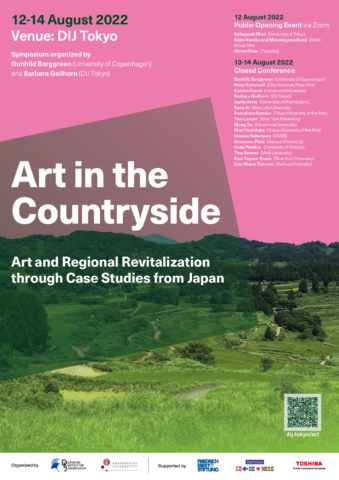
Twenty international experts and outstanding Japanese artists will meet at the DIJ in August to discuss how the arts can contribute to overcoming the multiple challenges facing regions in Japan. Since the early 2000s, regional arts projects and festivals have sprung up in many places in rural Japan, including the Triennial in Echigo-Tsumari and the Toyooka theatre festival. Many regions anticipate such events to create new types of social, cultural, and economic capital in the area. The symposium addresses ‘Art in the Countryside’ from an interdisciplinary perspective, including Visual and Performing Arts, Cultural Policy, Tourism Studies, and Social Anthropology. Limited places are available for on-site participation. The event is organised by Gunhild Borggreen (Copenhagen) and DIJ’s Barbara Geilhorn. It is part of their projects on Collaboration and Community Building in Contemporary Art and Local Issues Take Stage – Culture and Community Revitalization, respectively. Details and registration here








 Open Access
Open Access
